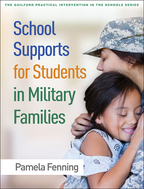School Supports for Students in Military Families
Pamela Fenning
HardcoverPaperbacke-bookprint + e-book
Hardcover
orderSeptember 16, 2021
ISBN 9781462546947
Price: $57.00 142 Pages
Size: 8" x 10½"
Paperback
orderSeptember 28, 2021
ISBN 9781462546930
Price: $38.00 142 Pages
Size: 8" x 10½"
The reproducible materials can be downloaded and printed in PDF format.
“This is a solid resource for school psychologists to better understand the needs and available support for students of military families whether at DOD or private/civilian schools. The information is concise and focused with abundant references directing readers to additional resources.”

—Doody's Review Service
“Early in my career, I was assigned an elementary and a high school serving large numbers of students from both a Navy and an Air Force base. I wish I had this text as a resource, to be more aware of and effective in serving this unique population.”

—NASP Communiqué
“Fenning provides school psychologists and counselors with information and resources to support military children in the academic, mental health, and social arenas. She gets down to the brass tacks about the hurdles that these youth and their families often face. Implementation of MTSS with military students is explained, as are legal issues that affect military children in public schools. All chapters feature case studies that bring the information to life for the school psychologist and counselor. This book is a 'must have' for Case Study Committees or IEP teams tackling how best to meet the needs of military students in a school.”

— Mark C. Pisano, EdD, NCSP, school psychologist, Fort Bragg Schools, Department of Defense Education Activity; Coordinator, Military Families Interest Group, National Association of School Psychologists
“Military-connected youth and families are among the least understood and most underserved populations in schools, making this book essential reading. Administrators, teachers, and school-based mental health professionals will benefit from the practical knowledge and resources provided to meet military students' developmental, academic, and social–emotional needs. A strengths-based MTSS approach that builds on the individual’s resiliency serves as the foundation. The unique stressors of deployment, multiple moves, and grief and loss are addressed, as are considerations for students with special needs. The content is relevant to the full range of military families, both active duty and reserve. As someone with direct experience working with Department of Defense schools, I believe this book fills a tremendous gap.”

—Melissa A. Louvar Reeves, PhD, NCSP, LCMHC, School Psychology Program, Winthrop University; past president, National Association of School Psychologists
“This user-friendly, practical book is an essential guide for understanding the unique strengths and challenges of military children and families. Case studies are used to illustrate how various evidence-based programs and practices can be integrated within a multi-tiered model of service delivery. It is very likely that students in any given school, regardless of proximity to a military installation, have family members serving in the military. School psychologists play a critical role in supporting the strengths and resiliency of these students. The book synthesizes research findings and includes insightful examples, as well as links to a wealth of resources, to help practitioners provide appropriate support.”

—Abigail Harris, PhD, NCSP, School Psychology Program, Fordham University
—Doody's Review Service
“Early in my career, I was assigned an elementary and a high school serving large numbers of students from both a Navy and an Air Force base. I wish I had this text as a resource, to be more aware of and effective in serving this unique population.”
—NASP Communiqué
“Fenning provides school psychologists and counselors with information and resources to support military children in the academic, mental health, and social arenas. She gets down to the brass tacks about the hurdles that these youth and their families often face. Implementation of MTSS with military students is explained, as are legal issues that affect military children in public schools. All chapters feature case studies that bring the information to life for the school psychologist and counselor. This book is a 'must have' for Case Study Committees or IEP teams tackling how best to meet the needs of military students in a school.”
— Mark C. Pisano, EdD, NCSP, school psychologist, Fort Bragg Schools, Department of Defense Education Activity; Coordinator, Military Families Interest Group, National Association of School Psychologists
“Military-connected youth and families are among the least understood and most underserved populations in schools, making this book essential reading. Administrators, teachers, and school-based mental health professionals will benefit from the practical knowledge and resources provided to meet military students' developmental, academic, and social–emotional needs. A strengths-based MTSS approach that builds on the individual’s resiliency serves as the foundation. The unique stressors of deployment, multiple moves, and grief and loss are addressed, as are considerations for students with special needs. The content is relevant to the full range of military families, both active duty and reserve. As someone with direct experience working with Department of Defense schools, I believe this book fills a tremendous gap.”
—Melissa A. Louvar Reeves, PhD, NCSP, LCMHC, School Psychology Program, Winthrop University; past president, National Association of School Psychologists
“This user-friendly, practical book is an essential guide for understanding the unique strengths and challenges of military children and families. Case studies are used to illustrate how various evidence-based programs and practices can be integrated within a multi-tiered model of service delivery. It is very likely that students in any given school, regardless of proximity to a military installation, have family members serving in the military. School psychologists play a critical role in supporting the strengths and resiliency of these students. The book synthesizes research findings and includes insightful examples, as well as links to a wealth of resources, to help practitioners provide appropriate support.”
—Abigail Harris, PhD, NCSP, School Psychology Program, Fordham University



